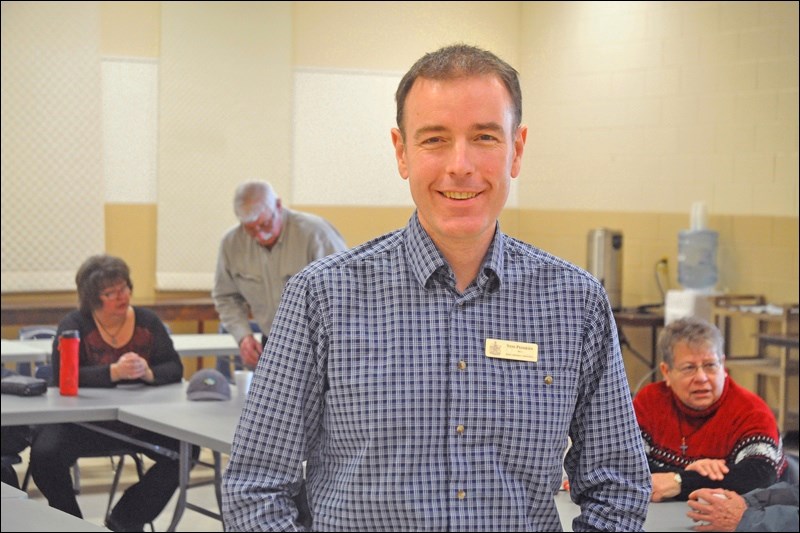NDP MLA Yens Pedersen gave food for thought to attendees at a recent North Battleford meeting.
Pedersen grew up on a farm near Cut Knife and practiced law in Regina before winning Regina Northeast in a by-election in Sept. 2018. As a lawyer, he worked in matters relating to agriculture, and is the NDP’s critic for agriculture and environment.
A half dozen people were in attendance at the Don Ross Centre for the meeting.
One matter was seed royalties, what many reports call a contentious and complex topic.
Seed companies own the rights to certain types of seed, and farmers benefit from such seed.
An argument seed companies put forth is farmers ought to pay royalties, and such royalties could go toward research and development of new seed.
Two proposed royalty models include end-point royalties, in which farmers pay when they deliver and sell grain, or trailing royalties, in which “farmers pay an ongoing and annual royalty to plant breeders for the use of farm-saved seed,” according to the Western Producer.
“Some grain growers say the introduction of either system will result in higher production costs and lower farmgate returns,” the newspaper writes.
“Why make the producer pay for it all when it benefits everybody in the country,” a farmer at the meeting asked.
Regarding royalties, Pedersen said there’s “no guarantee that money is put back into seed research for Saskatchewan.”
Other arguments centre on if a company ought to have “rights to control a very basic building block of life,” Pedersen said.
Climate change was another talking point. Pedersen said the NDP is looking to “clean up our act in Saskatchewan in a way that isn’t carbon tax.”
One such plan is Renew Saskatchewan. According to the Saskatchewan NDP website, the plan would “provide assessments and financing for clean energy installations or retrofits for homes, farms, businesses, industry, municipalities and reserves.”
“After an initial assessment to determine the lowest-cost and highest-return option for a given property or organization, some of all of the cost of the installation would be covered by the fund, and would be paid back over time from the customer’s power or energy bills based on the value of the power generated or fossil fuel energy saved by the installation.”
Pedersen said the upfront cost installing solar panels are a “huge barrier,” although savings could be achieved in the long run.
With the plan, Pedersen said people would “be able to pay off that financing with savings on their power bill, for instance.”
Pedersen also commented on Saskatchewan’s place in the larger climate change debate.
Compared to the rest of the world, Canada and Saskatchewan produce a “small chunk of the world’s CO2 and methane.” Yet, Pedersen said, a million people in China or India could make the same argument.
Pedersen said “we’re one of the most polluting parts of the world, per person,” he said, thus, “we have some obligations to do something about that.”
Developing countries look to the west and many people want quality of life that comes with western living, including, Pedersen said, a car, a standalone house, eating more meat and more variety of food generally.
“I hope that we can figure out a way that they can develop with a cleaner footprint,” Pedersen said. “If they grow their populations and their economies the way that we’ve done ours, we’re done.”
A cold climate province and country “is going to have a higher footprint than warmer parts of the world,” Pedersen said, “but that doesn’t get us off the hook.”
Pedersen spoke of ways to reduce “our footprint without substantially reducing our standard of living,” including driving electric cars with more efficient engines than internal combustion engines.
A farmer in attendance was skeptical of using electric vehicles on the farm, although responses in the discussion noted electric vehicles aren’t yet at a place where they’re viable on the farm.
Regarding mental health, Pedersen said the NDP doesn’t yet have a platform as the provincial election is still a way away, although Pedersen said the NDP has made mental health a focus, including designating a portfolio focused on mental health. Among other roles, Saskatoon MLA Danielle Chartier is critic for mental health and addictions.
In previous talks with education staff, Pedersen said “childhood anxiety and depression in students is way out of whack,” and access of people living in rural areas to mental health services “is a big issue.”
Mental health was also a relevant point in the Sask. Party’s 2018 budget, in which five per cent (or about $284 million) of the health budget was dedicated to mental health matters. Chartier argued such funding wasn’t enough.




